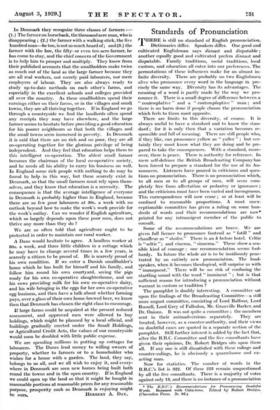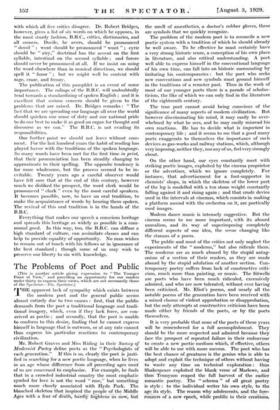Standards of Pronunciation
THERE is still no standard of English pronunciation. Dictionaries differ. Speakers differ. One good and cultivated Englishman says dienast and disputable ; another equally good and cultivated prefers dinnast and disputable. Family traditions, social traditions, local custom, and education all enter into our preferences. The permutations of these influences make for an almost in- finite diversity. There are probably no two Englishmen alive who pronounce every word in the language in pre- cisely the same way. Diversity has its advantages. The meaning of a word is partly made by the way we pro- nounce it. There is a small degree of difference between a " contemplative " and a " contemptaytive " man ; and there is no harm done if people choose the pronunciation which feels to them most apposite.
There are limits to this diversity, of course. It is always useful to have a standard and to know the stan- dard ; for it is only then that a variation becomes re- sponsible and full of meaning. There are still people who, if they like, can pronounce yellow as " yaller " ; but cer- tainly they must know what they are doing and be pre- pared to take the consequences. With a standard, more- over, there is peace. There is authority for reference. In mere self-defence the British Broadcasting Company has been forced to prepare a standard for the use of its An- nouncers. Listeners have poured in criticisms and ques- tions on pronunciation. There is no pronunciation which, to all men or to all groups of men, will seem com- pletely free from affectation or pedantry or ignorance ; and the criticisms must have been varied and incongruous.
This correspondence will now cease ; or at least will be confined to reasonable proportions. A most unex- ceptionable committee has given a ruling on some hun- dreds of words and their recommendations arc nom* printed for any intransigent member of the public to consult.
Some of the recommendations are brave. We are given full licence to pronounce fauteuil as " fotill " and chauffeur as " shofer." There is an h before hotel. Celtic is " seltic " ; and cinema, " sinnema." These show a sen- sible kind of courage : one recommendation seems fool- hardy. In future the whole air is to be insidiously pene- trated by an entirely new pronunciation. The loud- speaker, when it becomes theological, will surprise us with " immaynent." There will be no risk of confusing the startling sound with the word " imminent " ; but is that sufficient reason for introducing a pronunciation without warrant in custom or tradition ?
The pamphlet is doubly interesting. A committee sat upon the findings of the Broadcasting Committee—a still more august committee, consisting of Lord Balfour, Lord Russell, Lord Grey of Fallodon, Mr. Granville Barker, and Dr. Onions. It was not quite a committee ; the members sent in their animadversions separately. They are treated, however, as a counter-authority, and their views on doubtful cases are quoted in a separate section of the pamphlet. Still further interest is added by the fact that, after the B.B.C. Committee and the five consultants have given their opinions, Dr. Robert Bridges sits upon them all. If any one is still dissatisfied with these rulings and counter-rulings, he is obviously a quarrelsome and ex- acting man.
Now for statistics. The number of words in the B.B.C.'s list is 322. Of these 228 remain unquestioned by all the five consultants. There is a majority of votes against only 18, and there is no instance of a pronunciation * The B.B.C.'s Recommendations for Pronouncing Doubtful Words. Reissued with Criticisms. Edited by Robert Bridges. • (Clarendon Press. 3s. 6d.) with which all five critics disagree. Dr. Robert Bridges, however, gives a list of six words on which he opPoses, in the most sturdy fashion; B.B.C., critics, dictionaries, and all corners. Docile, he avers, should be pronounced " dossil " ; wont should be pronounced " wunt " ; eyrie should be " airy," doctrinal has the accent on the first syllable, intestinal on the second syllable ; and furore should never be pronounced at all. If we insist on using the word elsewhere than in musical directions, we should spell it " furor " ; but we might well be content with rage, craze, and frenzy.
The publication of this pamphlet is an event of some importance. The rulings of the B.B.C. will undoubtedly tend towards a standardizing of spoken English ; and it is excellent that serious concern should be given to the problems that are raised. Dr. Bridges remarks : " The fact that we are spreading our language all over the world should quicken our sense of duty and our national pride to do our best to make if as good an organ for thought and discourse as we can." The B.B.C. is not evading its responsibilities.
One further point we should not leave without com- ment. For the last hundred years the habit of reading has played havoc with the traditions of the spoken language. So many words have been met for the first time in print, that their pronunciation has been steadily changing to approximate to their spelling. The opposite tendency is far more wholesome, but the process seemed to be in- evitable. Twenty years ago a careful observer would have felt sure that at the end of this century, however much we disliked the- prospect, the word clerk would be pronounced " clurk " even by the most careful speakers. It becomes possible, now, to have an oral tradition, to make the acquaintance of words by hearing them spoken. The revival of this oral tradition is in the hands of the B.B.C. - • Everything that makes our speech a conscious heritage and spreads this heritage as widely as possible is a com- munal good. In this way, too, the B.B.C. can diffuse a high standard of culture, can assimilate classes and can help to provide equality of opportunity. No man wishes to remain out of touch with his fellows or in ignorance of the best standard ; though some of us may wish to preserve our liberty to sin with knowledge.



































 Previous page
Previous page